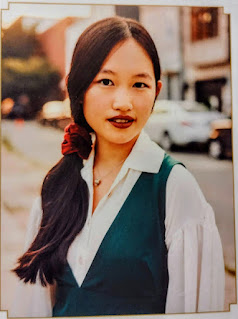By David Santos Donaldson
- Pub Date: 2021
- Genre: Literary fiction, magical realism
- Where I bought this book: Roebling Books & Coffee, Covington, Ky.
- Why I bought this book: I liked the cover art (by Devan Shimoyama)
- Bookmark used: Roebling Books & Coffee
******
The esteemed Edwardian-era author E.M. Forster wrote about shaking off the shackles of his time and place. His novels and essays revolved around humanism and man's place in the world.
In this debut novel, Donaldson attempts to go further, wandering through time, space, and thoughts. His protagonist and budding Forster fictional biography, Kipling Starling, tackles issues of accepting oneself and asserting your color, your culture, and your sexuality in a world that isn't sure it wants to have you around.
It starts with Kip explaining his novel-within-a-novel -- an examination of the three years that Forster, a conscientious objector, lived in Alexandria, Egypt, as a Red Cross volunteer during World War I. There, he met and fell in love with Mohammed el Adl, a tram conductor.
Kip, under pressure from himself and his publisher to rewrite the novel in three weeks, locks himself in the basement of an apartment he shares with his lover, Ben. In doing so, he imagines himself taking on the persona of Mohammed -- both are young, gay Black men, and each has fallen in love with an older, more established white man. Even the settings pair the two men -- in 1919, Mohammed spent six months in an isolated prison cell.
From there, the themes evolve as Mohammed speaks through Kip's novel, and Kip tells his own biography and evolution as a writer and gay man.
Kip is having an identity crisis and unable to define or accept himself. He says he is British because he was born and raised in "a perfectly Victorian house" -- and not British because his parents are of Caribbean and Indian heritages. He is named after one of the foremost racist and colonialist intellectuals of all time, the promoter and defender of the white man's burden.
Take up the White Man's burden--And reap his old reward,The blame of those ye better,The hate of those ye guard--
Kip is also aware that in his upbringing -- not unlike the times of Forster and Muhammed -- "if displays of desire were out of the question, homosexuality was unmentionable."
Kip has additional problems. His closest friend, Carmen, a Spanish woman open about her need to express and flaunt her sensuous nature, is dismissive of men, gay, straight or both, who fail to do the same, in favor of being comfortable. She puts Kip and Ben into that category. Kip's literary hero was a closeted gay man who published his only book addressing the issue of his homosexuality posthumously.
And in his writings, and in Forster's love affairs, Kip sees himself as many characters, but always the object of affection -- the exploited Mohammed, and the potential lover of Mohammed -- through the aura of time.
It all gets complicated, and you have to pay attention to the blending of dimensions, characters, and actions. There's a sense of magical realism here, even while Kip expresses his desire to be grounded in the reality of the present.


















